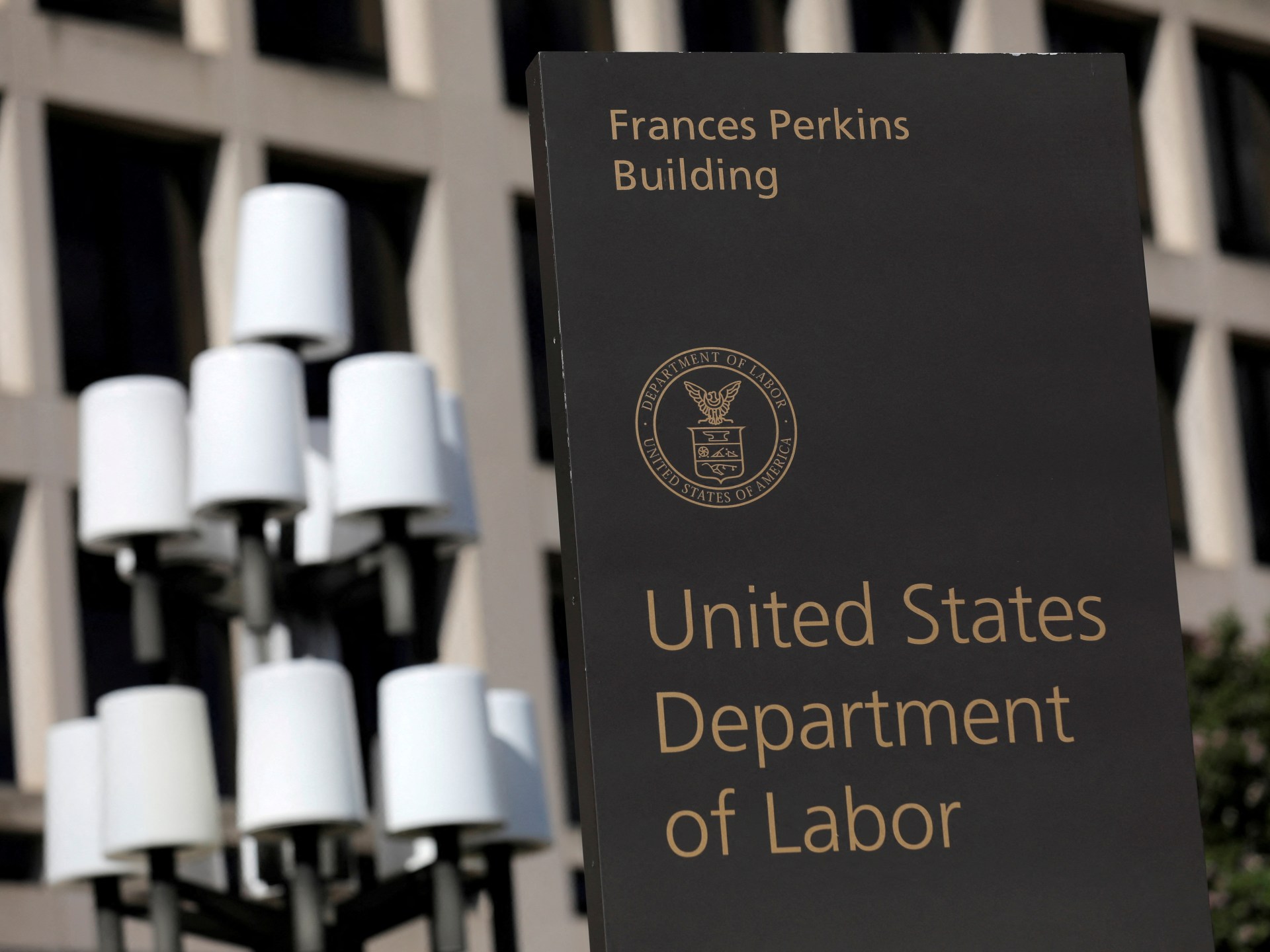‘We are scapegoats’: Arab journalists fired by Deutsche Welle | Media News
The recent firing of Arab employees from Deutsche Welle’s Arabic service on charges of alleged anti-Semitism has highlighted the country’s contentious policy, which some say equates criticism of Israel to prejudice and hatred of Jewish people.
The five employees of the German international broadcaster – all Palestinian or Lebanese – were investigated after an published by Sudduetche Zeitung last November “exposed” social media posts and articles they had written for outside publications that allegedly expressed anti-Semitism and anti-Israeli views.
Basil al-Aridi, Murhaf Mahmoud, Maram Salem, Farah Maraqa, and Dawood Ibrahim were suspended in early December and were fired on February 7 – the same day a two-month external inquiry was released.
They said they were not given a chance to read the inquiry or contest its findings.
The probe found that while there was no evidence of structural anti-Semitism at the media organisation, the journalists in question were guilty of anti-Semitism, and called for clearer guidelines for staff and broadcasting partners.
In a news conference on Monday, DW’s director-general Peter Limbourg apologised and promised to vet journalist candidates more rigorously in future.
“We must make our position much clearer in the future,” he said. “Freedom of expression is never a justification for antisemitism, hatred of Israel and denial of the Holocaust.”
A further eight employees at DW’s Arabic service are currently under investigation.
Maram Salem, one of the journalists affected, described the dismissals as “career assassination”.
“This is a huge blow to my reputation as a journalist,” she told Al Jazeera. “My chances of finding a job with any other international news organisation are over. It’ll be especially hard for me to get any kind of job in Germany now.”
Salem’s social media post that was flagged by the SZ article and subsequently probed was written in May 2021 and criticised the “illusion of freedom of speech in Europe”.
I just have been notified without further explanations that I will receive a notice of termination from Deutsche Welle with immediate effect. I have not yet been informed about the reasons, nor been handed out the report on which these allegations shall be based!
— Farah Maraqa (@Farah_Maraqa) February 7, 2022
“There are many red lines if we were to talk about the Palestinian cause,” she wrote. “Resorting to using code words is to prevent automatic translation by observers who are ready to either fire us from our jobs or deport us.”
Salem, who grew up in the occupied West Bank and began working for DW in January 2020, said that censorship was always present at the workplace.
“You don’t know where the line stops at anti-Semitism – it was extremely hazy,” she said. “During the escalation of events in Jerusalem and the Gaza Strip last May, I was told that I couldn’t write ‘Israel kills children’ as that was anti-Semitic. Writing about Israeli rights violations, you also get accused of anti-Semitism.”
Last May, DW reportedly sent an internal two-page memo to employees banning them from using terminology such as “colonialism” and “apartheid” when describing Israel.
Salem’s colleague Farah Maraqa, a Palestinian Jordanian, has written about her experience on her Medium page – claiming that she was unable to explain or defend her social media posts and articles in question while being attacked by some German media outlets.
She was accused of comparing Israel to a cancer in an article written in 2014 and of wanting to join ISIL (ISIS) in an article published the following year. Both statements, written in an ironic tone, were taken out of context, she said.
“Being placed in the headlines without the ability to fight back … made me sick,” Maraqa wrote.
“Working in Germany for more than four years made me realise how crazy these [anti-Semitism] allegations may go and how anyone could be unprotected when it comes to anything [critical] about Israel.”
At the time of publishing, DW had not responded to Al Jazeera’s request for comment.
Flaws in investigation
The external inquiry was led by psychologist Ahmad Mansour – a Palestinian citizen of Israel who arrived in Germany in 2004.
A self-professed expert on the “radicalisation” of Muslims, he is known for his staunch, pro-Israel views.
Mansour has worked with numerous government-backed groups such as the Muslim Forum Germany and acts as a voice of authority on issues such as Muslim integration into European societies and “de-radicalisation”.
But critics have said he has furthered negative stereotypes about Muslims as “extremists”, “terrorists”, and anti-Semitic.
“As soon as I heard that Ahmed Mansour would be on the inquiry, I knew that it would not be an impartial one and that any hope of working with DW again is over,” Maram Salem said.
At the inquiry, Salem said she was not asked a single question about her social media post.
“They asked personal questions about my childhood, how I was raised, what my political views are, and what I think of BDS,” she said, referring to the Boycott, Divestment and Sanctions movement.
The inquiry’s report based its framework on the IHRA extended definition of anti-Semitism, as well as another definition of anti-Semitism called the 3D Test (double standards, de-legitimation, demonisation) which was developed by far-right Israeli politician Natan Sharansky.
These definitions have been criticised as tools to silence dissent against Israeli policies and support for Palestinian rights.
“The institutionalisation of these populist definitions of anti-Semitism aims to consider all resistance and rejection of Israel’s policies as an accusation of anti-Semitism, and thus the mere presence of a Palestinian in Germany becomes a charge that needs to be justified,” Asem Qazaz, a Palestinian academic in Berlin told Al Jazeera.
“These populist projections are distributed across all sides of the German political spectrum, from right to left, and in the press and academic institutions, as well.”
A news release by the Euro-Med Human Rights Monitor examined the results and mechanisms of the inquiry, and found that it contained several instances of bias in favour of Israel and against Palestinians.
“While the report criticises DW as well as some of its employees and partners for alleged instances of one-sidedness, the report’s core recommendations and analysis basically aim to push DW towards embracing a one-sided pro-Israel narrative instead,” said Ramy Abdu, chairman of Euro-Med Monitor.
For example, the inquiry’s report said that an article on DW’s website about how Israel’s establishment was predicated on the Palestinian Nakba of 1948 – in which 750,000 Palestinians were ethnically cleansed from their villages, towns and cities – is anti-Semitic because it calls into question Israel’s right to exist.
Another example the inquiry found issue with was the “one-sided” narrative of the coverage of the Sheikh Jarrah neighbourhood in occupied East Jerusalem, which is at risk of ethnic cleansing.
The inquiry said the hashtag #SaveSheikhJarrah used by DW’s Arabic service and Arabic partners was “inappropriate” and “subjective Palestinian propaganda”.
Germany is home to the largest Palestinian minority in Europe, estimated at 200,000.
According to Qazaz, to be a Palestinian in Germany is to bear the brunt of the country’s historical guilt of the Holocaust “without any consideration of the different context” that Palestinians experience living under Israeli occupation.
“In recent years, the populist right has been using accusations of anti-Semitism against Arabs and immigrant Muslims as an easy way to practise racism against them because of their sympathy with the Palestinian people and the Palestinian cause,” he added.
In May 2019, Germany became the first European parliament to pass a non-binding resolution denouncing the BDS movement as “anti-Semitic”.
A Der Spiegel investigation two months later on the influence of pro-Israel lobby groups on German politics was denounced by the groups as anti-Semitic. This elicited a response from Der Spiegel editors who said the article was just exploring “questionable practices of lobby groups”.
In May 2021, Matthias Dopfner, chairman of the German publishing house Axel Springer, who describes himself as a non-Jewish Zionist, told employees who objected to raising the Israeli flag on the building’s headquarters to find another job.
Outlets such as Bild and Die Welt, which are owned by Axel Springer, were among those that criticised DW’s Arab employees.
Axel Springer has stated as one of its Principles and Values, the “support of Jewish people and the right of existence of the state of Israel”.
According to Maram Salem, the Sudduetche Zeitung article that began the saga was a calculated step to put DW in the firing zone by other German outlets, to get more government funding for themselves.
“We are the scapegoats,” she said.





Pingback: ebay 4 aco dmt,
Pingback: แทงหวยออนไลน์